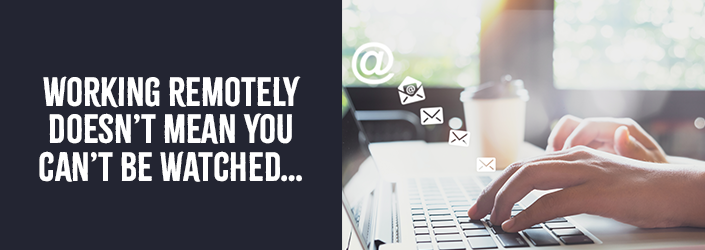Working remotely doesn’t mean you can’t be watched…

Given the uncertainties of this COVID era, working remotely has become a necessity when government directives advise schools to lock down to all but the most essential students and staff.
Working remotely might take you away from prying eyes over your shoulder, but chances are, your employer-supplied devices may be monitored, and this could have ramifications should your usage not fit within school policy.
So what should you be aware of when using school devices remotely?
It may seem obvious, but if you are using an employer’s device, assume you are being monitored.
Under the Surveillance Devices Act 2016 (SA), private activity cannot be recorded or observed in any form or method without the express consent of those persons being observed or recorded.
An employer should review their IT monitoring policies and practices and consider if employee consent must be obtained to lawfully continue monitoring. Implied consent is not sufficient.
Put simply, an employer can do this by fully informing the employee of what is being monitored and how – eg. optical surveillance devices (CCTV), tracking devices (for tracking the location of a person, vehicle, or thing), and data surveillance devices (to access, track, monitor or record the flow of information to or from a computer or similar device – including keystrokes).
If your employer hasn’t given you a policy or explained what tracking is on your device, organise to establish this with them with high priority.
It is important for employees to remember that if surveillance takes place whilst working remotely at their home, there is potential for unexpected privacy breaches of other members in the household.
Be very wary of what someone else is doing, wearing (or not), listening to, saying or watching within audible/visual range of a work device – it may be recorded.
Be aware of private use of work devices
An employer can only collect and use an employee’s personal information if it is directly related to their employment relationship, as mandated by the Australian Privacy Principles under the Privacy Act.
Whilst it might be convenient to save private information on your work device, in reality, your information is likely to be saved or backed up to an employer’s computer server, giving them full access to any information.
As such, gossip or discussions about workers, bosses or employers sent to private email addresses may be accessed and used in legal matters.
Best practice is to use your work devices ONLY for work-related activities. Private matters (including online banking or shopping) should be conducted on your private devices.
Remote working is going to be with us for some time potentially, to avoid any future employment issues or legal matters, use your work devices for work only.
Sources
https://www.legislation.sa.gov.au/LZ/C/A/SURVEILLANCE%20DEVICES%20ACT%202016/CURRENT/2016.2.AUTH.PDF
https://lynchmeyer.com.au/legal-updates/surveillance-laws-in-south-australia-whats-new
https://piperalderman.com.au/pdf/?post=r&id=6608

